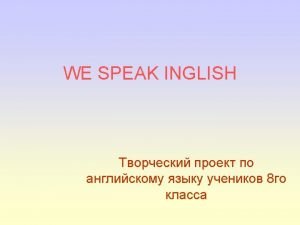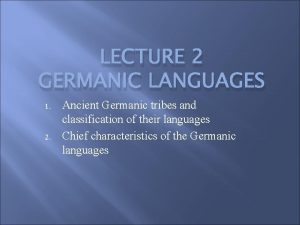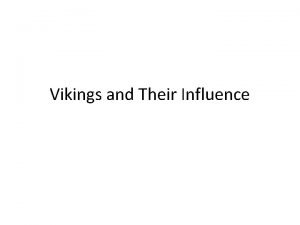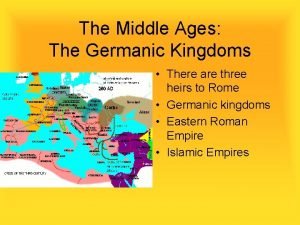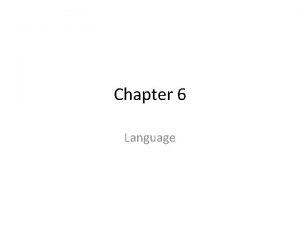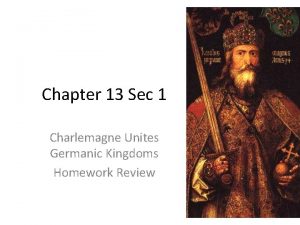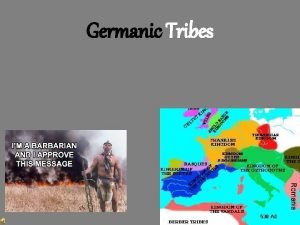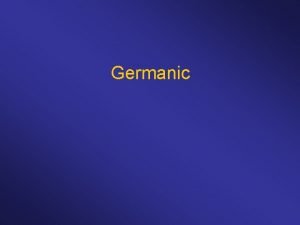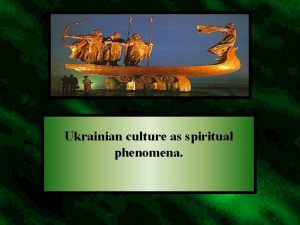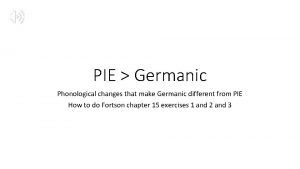English language English is a Germanic Language of






- Slides: 6


English language English is a Germanic Language of the Indo-European Family. It is the second most spoken language in the world. It is estimated that there are 300 million native speakers and 300 million who use English as a second language and a further 100 million use it as a foreign language. It is the language of science, aviation, computing, diplomacy, and tourism. It is listed as the official or coofficial language of over 45 countries and is spoken extensively in other countries where it has no official status. English plays a part in the cultural, political or economic life of the following countries.

Antigua Australia Bahamas Barbados Belize Bermuda Botswana Brunei (with Malay) Cameroon (with French) Canada (with French) Dominica Fiji Gambia Ghana Grenada Guyana India (with several Indian languages) Ireland (with Irish Gaelic) Jamaica Kenya (with Swahili) Kiribati Lesotho (with Sotho) Liberia Malawi (with Chewa) Malta (with Maltese) Mauritius Namibia (with Afrikaans) Nauru (with Nauruan) Englishspeaking countries New Zealand Nigeria Pakistan (with Urdu) Papua New Guinea Philippines (with Tagalog) Puerto Rico (with Spanish) St Christopher and Nevis St Lucia St Vincent Senegal (with French) Seychelles (with French) Sierra Leone Singapore (with Malay, Mandarin and Tamil) South Africa (with Afrikaans, Xhosa and Zulu) Surinam (with Dutch) Swaziland (with Swazi) Tanzania (with Swahili) Tonga (with Tongan) Trinidad and Tobago Tuvalu Uganda United Kingdom and its dependecies United States of America and its dependencies Vanatu (with French) Western Samoa (with Samoan) Zambia Zimbabwe

Varieties of English • • • • American English Australian English British English Canadian English Caribbean English in India Irish/English New Zealand Nigerian English in the Philippines Scots/English Singaporean English South Africa Welsh/English Sign Language - Braille

Australian variety of English Some words and expressions are quite naturally taken from British slang. Some words have completely different meanings in Australia than in Anglophone countries north of the Equator. A number of commonly-used words have been shortened considerably. Other words are indigenous to Australia and derived from Aboriginal terms, such as 'boomerang' and 'kangaroo'. In general, however, the wonderful slang of Australian English is primarily because Australians take English as a game to be played, and they love to have fun with it. Some of the words and expressions are readily understandable but others can be incredibly obscure in their meanings and derivations. In addition to the slang, Australian pronunciation can be peculiar. To the casual listener is sounds similar to Cockney pronunciation, but it differs in many ways. Australian speech also tends to be more contracted, with some sounds and even entire syllables omitted. Australian pronunciation has slight regional variations, and city speech tends to be faster than country speech. Some oversimplified rules of Australian speech are to speak slightly nasally, to contract any word of more than 2 syllables and to convert terms into diminutives wherever possible. Most obvious in Australian speech are the 'I' sound for 'A' and 'Ah' for 'R'. These can best be illustrated with examples of pronunciations such as 'egg nishner' = 'air conditioner', 'G'dye, myte' = 'Good day, mate', 'Strine' = 'Australian', or 'Wyne chevva cold share' = 'Why don't you have a cold shower. ' (American English has some similar examples, as in the phrase 'Jeet jet? ' = 'Did you eat yet? ') In general, the differences in Australian English are more amusing than irritating, despite the occasional confusion that may result. Give it a burl!

Australian –English Glossary A Aggro – aggressive G Apple eater –resident of Tasmania Game –brave Arvo – afternoon H Aussie –Australian Hooley –wild party B Hoon –hooligan Beauty –very good Hotel –pub Belt up – shut up I Bickie –dollar In full weather –in fine health Bloke - person K C Kangaroo –shoe Chook –chicken Kiwi –New Zealander Cow –anything that is difficult M Cozzie –swimming costume Matey with –friendly with D Mozzie –mosquito Darks –trousers N Dead horse –tomato sauce Nana –banana Dinkie die –the truth Nit -fool E P Earbash -non-stop talk Piss –alcohol Evo – evening Pommy –English person F Pub –hotel Flog –steal Good on ya! –well done R Ripper –good Roo –kangaroo T Telly –TV Tucker –Food U Uni –university W Wag –to skip school Y Yakka –hard work Yobbo –aggressive person Youks –a long time
